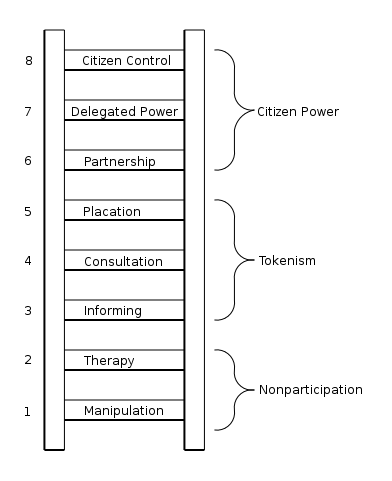I was just reading Arnsteins piece on the ladder of participation again and was struck at how far 'uses' of the ladder of participation have moved from her original idea, which was bound to time and place and rooted in civil rights work in the 20th C USA.
I'd spotted this before, but looking at the end of the piece the difference between her context and the project-bound notion of participation is why you get these contradictions all around when trying to climb the ladder of participation.
She says about citizen control:
I'd spotted this before, but looking at the end of the piece the difference between her context and the project-bound notion of participation is why you get these contradictions all around when trying to climb the ladder of participation.
She says about citizen control:
Demands for community controlled schools, black control, and neighborhood control are on the increase. Though no one in the nation has absolute control, it is very important that the rhetoric not be confused with intent. People are simply demanding that degree of power (or control) which guarantees that participants or residents can govern a program or an institution, be in full charge of policy and managerial aspects, and be able to negotiate the conditions under which "outsiders" may change them.
A neighborhood corporation with no intermediaries between it and the source of funds is the model most frequently advocated. A small number of such experimental corporations are already producing goods and/or social services. Several others are reportedly in the development stage, and new models for control will undoubtedly emerge as the have-nots continue to press for greater degrees of power over their lives.
Though the bitter struggle for community control of the Ocean Hill-Brownsville schools in New York City has aroused great fears in the headline reading public, less publicized experiments are demonstrating that the have-nots can indeed improve their lot by handling the entire job of planning, policy-making, and managing a program. Some are even demonstrating that they can do all this with just one arm because they are forced to use their other one to deal with a continuing barrage of local opposition triggered by the announcement that a federal grant has been given to a community group or an all black group.It's about civic participation and a context which is about communities taking the right to participate in the face of much opposition. A long way from projects which seek to draw communities into projects by 'offering' some power.

No comments:
Post a Comment